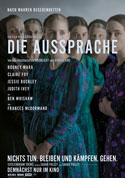

Opening 9 Feb 2023
Directed by:
Sarah Polley
Writing credits:
Sarah Polley, Miriam Toews
Principal actors:
Rooney Mara, Judith Ivey, Emily Mitchell, Kate Hallett, Liv McNeil
This powerful drama is set in an isolated Mennonite community in rural Canada, where many of the women have been subjected to horrific acts of sexual violence. For years, men in the religious community have drugged women with animal tranquilizers and raped them while they slept. When the women report these attacks, they are told by the community’s leaders that they have been set upon by demons, while in fact it is their neighbors, their fathers, their brothers. Eventually some men are caught, arrested, and taken to a nearby town to await trial. When the remaining men in the community go to town to bail out the accused, the women are told they have two days in which to forgive the men who have perpetuated these attacks. Instead, while the men are away, the community’s women gather to vote on a course of action: stay and do nothing; stay and fight; or leave and walk away from the only life they’ve ever known.
Director and screenwriter Sarah Polley opens her film with this momentous decision, with the women converging on a barn to vote. When there is a tie between staying and fighting and leaving, three families are designated to hash out the decision. Because they have purposefully been kept uneducated and illiterate, the women ask the male schoolteacher, August (Ben Whishaw), to take the minutes of their meeting. And then they set about discussing and weeping and howling with anger and indignation. All the while they debate their own complicity in their abuse and agonize over whether they will risk damnation or miss out on the glory of heaven if they voluntarily leave their community and the faith that is so central to their lives and identities. (The movie is based on a novel by Miriam Toews, which is based on true events that took place at a Mennonite community in Bolivia.)
Almost the entire movie, filmed in black and white, is set within the barn where the women lay bare their pain and struggles to do right by themselves, their children, their god. Through all of their talking, we learn about the specific suffering of some of the women, from Salome (Claire Foy), whose 4-year-old daughter was raped and who contracted an STD as a result, and her sister Ona (Rooney Mara) who is unmarried and pregnant by her rapist, to matriarch Greta (Sheila McCarthy) who apologizes to her daughter Mariche (Jessie Buckley) for not intervening in her violent marriage, and provides lighthearted interludes by offering advice gleaned from watching the behavior of her horses. These actresses absolutely dazzle on screen: their speeches and pained outbursts and real struggle with faith and duty, both to oneself and community, are mesmerizing to watch. It’s an engrossing watch, and an entirely memorable work of art. And yet, it doesn’t manage to be entirely convincing as a film because it feels like a theater production rather than a cinematic experience, with the barn as a stage that occasionally pulled me out of the drama and reminded me that I was watching actors act. Despite that, this is a film that should be seen, as it is a striking examination of topics – violence, sexual abuse, patriarchy – that affect our society as a whole, not just this tiny fanatical corner of the world. I’m already wondering how I’ll feel about it on a second viewing. (Diana Schnelle)